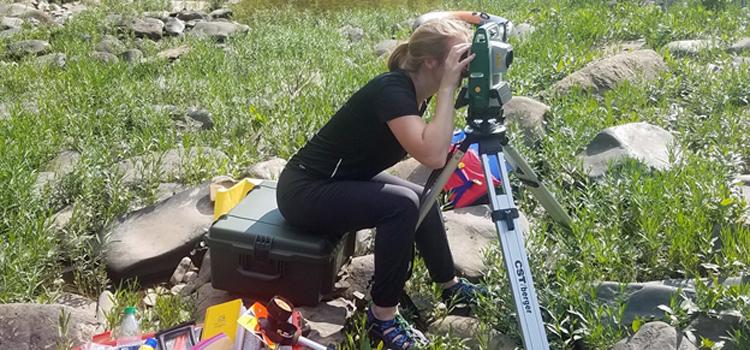

- Admissions Information
- Minor requirements
- Minor code: OR3326
Faculty Contact: Katherine Fornash
Program Overview
The Environmental Geosciences provides the opportunity to gain a broad overview of the geological aspects of environmental science, particularly surface processes such as rivers and mass wasting, surface and groundwater resources and analysis, geochemical processes, pollution and sustainability issues. Students are offered a range of electives so that students can customize their coursework to optimize learning about specific aspects of environmental geoscience. This minor can greatly benefit students planning to pursue careers in environmental science, remediation, and policy because students gain experience with groundwater and surface water processes that are critical habitats for life and critical resources for human populations and sustainability initiatives.
Admissions Information: Freshman/First-Year Admission
No requirements beyond University admission requirements.
Change of Major/Minor/Certificate Policy
No selective or limited admission requirements.
External Transfer Admission
No requirements beyond University admission requirements.
Opportunities Upon Graduation
Students completing the environmental geoscience minor will develop skills and training that will enhance their opportunities to purse graduate work in environmental science, pursue employment within environmental consulting and management, environmental science, and environmental policy development.
Requirements
Minor Hours Requirement
The geological sciences minor requires a minimum of 19 hours.
Introductory Geological Sciences
Complete one of the three options.
Option 1
- GEOL 1010 - How The Earth Works Credit Hours: 4
Option 2
Complete the following course, plus an additional course as a prerequisite.
- GEOL 2020 - Introductory Geology Lab Credit Hours: 1
- Plus one of the following courses:
- GEOL 1200 - The Mobile Earth Credit Hours: 3
- GEOL 1300 - Geology of the National Parks Credit Hours: 3
- GEOL 1350 - Natural Disasters Credit Hours: 3
- GEOL 1400 - Dinosaurs and the Mesozoic Credit Hours: 3
- GEOL 1700 - Metal, Stone, Energy, and Society Credit Hours: 3
- GEOL 2080 - Geology of the Solar System Credit Hours: 3
- GEOL 2110 - Introductory Oceanography Credit Hours: 3
- GEOL 2150 - Environmental Geology Credit Hours: 3
- GEOL 2170 - Water Resources and Sustainability Credit Hours: 3
- GEOL 2210 - Earth and Life History Credit Hours: 3
- GEOL 2310 - Water and Pollution Credit Hours: 3
- GEOL 2710 - Extreme Ancient Climates Credit Hours: 3
Option 3
- GEOL 2830 - Geology for Engineers Credit Hours: 4
Required Core Courses
- GEOL 3300 - Principles of Geomorphology Credit Hours: 3
- GEOL 3700 - Groundwater Fundamentals and Practices Credit Hours: 3
Environmental Geoscience Electives
Complete additional courses from the list below, at least one of which must be at the 3000-level or above.
- GEOL 1350 - Natural Disasters Credit Hours: 3
- GEOL 2150 - Environmental Geology Credit Hours: 3
- GEOL 2170 - Water Resources and Sustainability Credit Hours: 3
- GEOL 2310 - Water and Pollution Credit Hours: 3
- GEOL 3120 - Earth Materials and Resources Credit Hours: 3
- GEOL 3500 - Stratigraphy-Sedimentology Credit Hours: 3
- GEOL 4270 - Water Geochemistry Credit Hours: 3
- GEOL 4290 - Contaminant Geochemistry Credit Hours: 3
- GEOL 4260 - Principles of Geochemistry Credit Hours: 3
- GEOL 4390 - Fluvial Geomorphology Credit Hours: 3
- GEOL 4710 - Advanced Environmental Geology Credit Hours: 3
- GEOL 4800 - Principles of Hydrogeology Credit Hours: 3
- GEOL 4811 - Advanced Hydrogeology Credit Hours: 3
- GEOL 4830 - Field Hydrology Credit Hours: 4
